What kind of master’s degree is right for me?
Posted on Thursday, March 14th, 2024
Written by Jadyn Koehler, OAC undergraduate student


Deciding on a master’s program in food, agriculture, communities or the environment can be overwhelming. You might be asking yourself:
- “What’s the difference between a course-based master’s program and thesis-based?”
- “What careers can I pursue with a master’s in agriculture and food?”
- “What is a major research project (MRP)?”
- “Do I need to find a faculty advisor?”
This article will list the key differences between a master’s by coursework and a master’s by thesis, to help you decide which is the best fit for you!
Do you want to complete more courses or research in your master’s program?
In both course-based and thesis-based master’s programs, you will be required to take some graduate level courses, but the main difference between them is how many. Course-based programs typically fall under one of two frameworks for completion:
- A strictly coursework program: you must enroll in certain courses to earn your degree, or
- A coursework + major research project (MRP) program: you must complete several courses in addition to a MRP to graduate.
It may be helpful to think of a MRP as a “mini-thesis” of sorts; the scope of the project is smaller than a thesis and does not need to be a new contribution to the discipline, but it still needs to be well-researched and academically strong!
Thesis-based programs, on the other hand, are research intensive. The small number of courses you complete are more tailored to your specific research interests. To graduate, you need to complete and defend a thesis that contributes something new to your discipline. Much of your time is spent conducting research and working towards this goal.
Discover course-based and thesis-based masters programs from the Ontario Agricultural College
Complete your master’s degree in months vs. years.
Another big difference between course-based and thesis-based is the length of the program. Course-based master’s programs typically take around 1 year to complete (3-4 semesters of full-time study), while thesis-based programs are a longer commitment and are often completed in 2 years (5-6 semesters of full-time study). Remember that these are general timelines for both types of programs, but individual completion times can vary based on personal circumstances, part-time semesters, and more.
Finding an advisor for your master’s degree
The majority of the course-based master’s offered by OAC do not require you to find an advisor prior to applying. In most cases, you can find an advisor after you have been accepted into, or started, your program.
If you’re applying to a thesis-based program, in most cases you are required to find a faculty advisor willing to advise you on your studies and research before submitting your application. Some exceptions (thesis-based master’s that don’t require students to have an advisor before applying) are the Master of Landscape Architecture (MLA) and the MSc in Food, Agricultural and Resource Economics (FARE) programs.
How to fund your master’s degree
A big draw of thesis programs is that students are often able to receive funding to help them pay for their graduate studies. Many thesis-based programs in the OAC offer master’s students a minimum stipend for each year of their program (the exact amount or if it is offered varies by department). Thesis students are also eligible for paid roles such as Graduate Teaching Assistantships (GTAs), Graduate Research Assistantships (GRAs), and Graduate Service Assistantships (GSAs), and can apply for a plethora of different scholarships ranging from internal to government funded awards.
Alternatively, course-based master’s programs are often self-funded, meaning that no guaranteed funding is offered by the department and students are largely responsible for funding their studies themselves. There are still a number of scholarships available for course-based master’s students and other opportunities for funding, such as bursaries, that can make pursuing a course-based program feasible and affordable for many students.
You can learn more about funding here: How to Finance Your Degree: Guide to Awards and Master’s Program Scholarships | Ontario Agricultural College
More comprehensive vs more specific
With both program types, you will specialize your learning in a specific area by choosing a field to focus on and will often take multiple courses on this particular field. For example, OAC’s Department of Animal Biosciences offers four different specializations within their master’s programs; a student specializing in Animal Nutrition would therefore take courses such as Advanced Animal Nutrition, Metabolism, and Techniques in Animal Nutrition Research in both the thesis and course-based programs. However, students in the course-based program are also required to take courses outside of their specialization, while thesis students typically focus on their main specialization. Thesis programs = more focused. Course-based programs = more comprehensive.
Course-based master’s programs allow students to gain a broader understanding of their chosen topic area, and with the addition of experiential learning opportunities such as workplace projects and internships, can help students prepare to enter the workforce and begin building a career in their chosen field.
With a thesis-based program, students take that a step further and are able to delve really deeply into their area of research as they complete their thesis, effectively preparing them for future careers in research or to continue their educational journey in a PhD program, for example. However, remember that everyone’s path is their own, and both a course-based or thesis-based program can properly prepare you for your future career and further education by giving you transferable skills, hands-on experience, and a place in the close-knit OAC community at the University of Guelph!
You may want to consider a course-based master’s program if:
- You want a program that allows you to explore your subject area and field through a focus on coursework rather than research
- You want a program that you can complete quickly (only 1 year)
- You don’t necessarily want to find or decide on a faculty advisor right away
- You are willing to take on the responsibility of self-funding your studies
- You want to gain a comprehensive understanding of your subject area and field while completing courses and engaging in experiential learning opportunities
You may be interested in a thesis-based master’s program if:
- You want a program that is more research-intensive with less coursework requirements
- You want a longer program (2 years vs 1)
- You are willing to find a faculty advisor before applying to your program
- You would like the opportunity to receive funding during the completion of your program
- You want to learn really deeply about a specific topic while conducting your own research, and eventually write and defend a thesis
About Jadyn Koehler (she/her)
Jadyn is a motivated 4th year student at the University of Guelph currently working on completing her undergraduate degree in the Bachelor of Arts and Sciences (BAS) program with minors in History and Nutritional and Nutraceutical Sciences. She is passionate about learning, nutrition, and animals, and hopes to pursue a graduate degree (MSc) in the field of nutritional sciences next year.
Share this page
- Share on Facebook
- Share on Twitter
- Share on LinkedIn
- Print this page
News Archive
News topics.
- College News
- Student Perspectives

- October 15, 2023
- Academic Advice
Thesis vs. Non-Thesis Master’s Programs: Which is Right for You?
UOTP Marketing

Continuing your educational journey within your chosen field is an experience that fosters personal and professional growth. The next milestone in your academic path often involves pursuing a Master’s degree , with options ranging from thesis-based programs to non-thesis alternatives. Deciding between these two paths is significant as it shapes your academic and career paths.
But how can you decide which is right for you before getting decision fatigue?
Let’s explore the difference between thesis vs. non-thesis Master’s programs, their unique characteristics, and reasons for choosing one or the other.
Do You Have to Write a Thesis for Your Master’s Program?
Whether you have to write a thesis for your Master’s program depends on the specific requirements of the program you’re enrolled in. It’s important to note that while not all Master’s programs require writing a thesis, a significant number of them do.
What is a Thesis vs. Non-Thesis Master’s Program?
A thesis Master’s program involves completing a large research project spanning over several semesters. Students are expected to conduct original research on a specific topic under a faculty advisor’s guidance, culminating in a thesis likely to be published. Completing and defending the thesis is a crucial part of the degree requirement.
A non-thesis Master’s program doesn’t involve a specific research focus but rather a more coursework and practical experience, allowing students to gain specific skills and knowledge applicable to their field of study. After completing their program’s core course requirements, students can choose any of the electives to meet their degree requirements. Depending on the institution, you may be required to do a Master’s Degree Capstone project, including reviewing previous courses, a comprehensive exam, or a summary project.
Why Choose a Thesis Master’s Program?

Thesis Master’s programs offer several advantages, be that contributing to new findings in your field, close collaboration with professors and researchers, and standing out to potential employers with your abilities to work independently and analyze complex issues. However, the primary advantages are:
Research Experience
Thesis programs allow you to conduct extensive research on a specific topic that piques your interest. This way, you’ll gain expertise and a comprehensive understanding of the subject matter.
Academic Growth
Writing a thesis helps sharpen your critical thinking, analytical, and writing skills. It also challenges you to think independently, analyze a large amount of data, and draw meaningful conclusions. Furthermore, it prepares you for doctoral studies, familiarizing you with the rigor of independent research and equips you with the necessary skills to succeed.
Why Choose a Non-Thesis Master’s Program?
Non-thesis master’s programs also come with numerous advantages for students, including flexibility in scheduling, a range of career opportunities, shorter competition time, etc. Here are the main advantages:
Non-thesis programs prioritize coursework, fostering the development of practical skills and their real-world application. This approach enables you to actively engage in hands-on learning experiences highly sought after in today’s job market. Critical thinking, communication, problem-solving, and leadership abilities are some of those skills.
Suitability for Professionals
Another advantage to pursuing a non-thesis Master’s program is that it doesn’t take as much time as the thesis Master’s programs. That way you can enter the workforce faster. It’s also well-suited for professionals already established in their field who are seeking to further their education and advance in their careers.
The Academic and Career Outcomes of Thesis vs. Non-Thesis Master’s Programs

The academic outcomes for the thesis Master’s program graduates involve preparation for Ph.D. programs , opening doors to advanced research and specialized roles in research institutions. This provides solid research skills and helps them publish their work. Common career paths for graduates include research positions in academia, government, or private sectors. Some also pursue teaching careers in colleges and universities. Degree programs that usually require a thesis include sciences, social sciences, engineering, and humanities (history, philosophy, and language studies).
Non-thesis Master’s program graduates typically achieve academic outcomes focused on mastering practical, directly applicable skills within their field. While these programs are more career-oriented, graduates can still pursue a Ph.D. They can benefit from diverse career options in different settings and find employment in managerial, administrative, or specialized roles in their field. Degree programs that don’t usually require a thesis are business, education, healthcare administration, IT management, etc.
Thesis vs. Non-Thesis Master’s Programs, That is the Question
With their abundance of advantages, choosing between the two can be pretty tricky. So, let’s compare thesis vs. non-thesis Master’s programs and help you make an informed decision.
Personal and Career Goals
A thesis Master’s program is ideal if you’re interested in furthering in academia and want to pursue a Ph.D ., as these programs can provide the necessary tools to enhance your credentials for research-based careers. Meanwhile, a non-thesis Master’s program will suit you better if you’re seeking to gain practical skills to integrate into the industry immediately, as they can include practical projects or internships according to industry demands.
Time and Financial Considerations
Thesis Master’s programs can extend the duration of your studies, as researching, writing, and defending the thesis can take several semesters to complete and can cause financial strain due to additional costs like lab fees and materials. In contrast, non-thesis ones can help you enter the job market promptly as they are shorter, allowing you to save time and money.
Interested in pursuing a degree?
Fill out the form and get all admission information you need regarding your chosen program.
This will only take a moment.
Message Received!
Thank you for reaching out to us. we will review your message and get right back to you within 24 hours. if there is an urgent matter and you need to speak to someone immediately you can call at the following phone number:.
By clicking the Send me more information button above, I represent that I am 18+ years of age, that I have read and agreed to the Terms & Conditions and Privacy Policy , and agree to receive email marketing and phone calls from UOTP. I understand that my consent is not required to apply for online degree enrollment. To speak with a representative without providing consent, please call +1 (202) 274-2300
- We value your privacy.
Field of Study and Program Requirements
When deciding between a thesis and a non-thesis Master’s program, a crucial element to take into account is the field of study and the program’s specific requirements. A thesis Master’s program is better suited for those pursuing research-oriented fields, while a non-thesis program is a more fitting choice for individuals with a strong focus on their career. Furthermore, program requirements for thesis programs require substantial research to culminate in a thesis, whereas non-thesis ones require capstone projects, internships, or comprehensive exams.
Switching from a Non-Thesis to a Thesis Master’s Program, or Vice Versa
Switching from a non-thesis to a thesis Master’s program, or vice versa, is possible in many institutions, although the process and requirements may vary. Switching from a non-thesis to a thesis program generally requires getting approval from the academic advisor or department, completing additional research methodology classes, finding a thesis advisor, and applying to the thesis program.
Switching from a thesis to a non-thesis Master’s program requires having at least a 3.0 GPA, getting approval from the academic advisor, transferring credits of research methodology classes, and formally applying to the thesis program.
Choosing between a thesis and a non-thesis Master’s program ultimately depends on your career goals, research interests, and personal preferences. Thesis programs provide a robust foundation for research-oriented careers and advanced studies, while non-thesis programs offer practical skills tailored for immediate industry integration. Regardless of your choice, both paths offer unique advantages, ensuring you gain the knowledge and skills needed to thrive in your chosen field.
Frequently Asked Questions (FAQs):
What is the difference between a thesis vs. non-thesis master’s program.
The key difference between a thesis and a non-thesis Master’s program is that thesis Master’s programs require original research and completion of a thesis, whereas non-thesis ones focus on coursework and practical experiences.
Do I have to write a thesis for a Master’s program?
If you’re pursuing a research-oriented Master’s degree in sciences, engineering, social sciences, humanities, etc., you’ll probably have to write a thesis. Whereas, if you’re pursuing a Master’s degree in education, business healthcare administration, or IT management, you’re more likely not to have to complete a thesis.
Is a thesis required for all Master’s degree programs?
Although a thesis isn’t required for all master’s degree programs, many programs require one.
What should I consider when deciding between a thesis and non-thesis program?
There are several factors to consider when choosing between a thesis and a non-thesis Master’s program, including your career goals, interest in research, duration of studies, personal strengths and preferences, cost, and program requirements.
Are there any financial and duration differences between thesis and non-thesis Master’s programs?
There can be financial and duration differences between thesis and non-thesis Master’s programs. Thesis programs can be more expensive as you’ll have to spend additional resources on materials, lab fees, and data collection. In contrast, the main cost for non-thesis programs is tuition fees, which can be slightly lower. Furthermore, thesis programs require additional time to conduct research, write, and defend the thesis. In contrast, non-thesis programs allow students to earn the degree in a shorter period.
Why should I choose a thesis Master’s program?
You should choose a thesis Master’s program if you’re interested in a research-heavy discipline and want to showcase your knowledge and expertise in an evidence-based, thorough thesis.
Why should I choose a non-thesis Master’s program?
You should choose a non-thesis Master’s program if you want to enter the workforce earlier, don’t want to spend several semesters collecting data, and want to focus more on application than research.
Can non-thesis Master’s graduates still pursue doctoral studies later?
Yes, non-thesis Master’s graduates can still get accepted into a doctoral program. However, thesis Master’s graduates can go through the process more efficiently, as admissions panels want to gain insight into your academic interests and ability to engage in nuanced thought.
Share it with your friends!
Explore more.

Accounting vs. Finance Degree: Which Major to Choose?

12 Important Bookkeeping Skills You Need for a Successful Career
Recent resources.

What Is Scope In Project Management?

5 Phases of Project Management Explained

Master’s Degrees: The Best Paying Fields

COO vs CEO: Differences and Responsibilities
INTERESTED IN LEARNING MORE?
Chat with an Admissions Officer Now!

- Associates Degree
- Bachelors Degrees
- Masters Degrees
- Doctoral Degrees
- Faculty & Staff
- Accreditation
- Student Experience
QUICK LINKS
- Admission Requirements
- Military Students
- Financial Aid
Request More Information
Webinar Invitation: Explore the UK and other Study Destinations
Course-based Vs Research-based Master’s Programs || Which Is Best For You?
Ebere Nsofor
- Share on Facebook
Table of Content
If getting a master’s degree is in your academic or career plans, then you need to fully understand what it entails. Getting a master’s degree is a great way to advance your career or kick-start a new career. However, there are different types of master’s degrees offered by universities. This article will discuss course-based and research-based masters to help you understand what they mean and how they are different.
Course-based programs
Course-based master’s degree programs are designed for students who want to learn new skills, gain knowledge, and advance their careers. These structured programs offer students a set of courses to complete for their degree. The courses are designed to provide students with the necessary skills and knowledge to succeed in their chosen careers.
Research-based programs
Research-based master’s degree programs are designed for students who want to conduct research, develop new knowledge, and contribute to their field. These programs are research-intensive and require students to conduct original research and write a thesis or dissertation. The research conducted should contribute to the knowledge base of the field.
Top Frequently Asked Questions on Study Abroad For International Students
Differences between Course-Based and Research-Based Master’s Degree Programs
Though both programs have their unique advantages, they are tailored to different career goals and learning styles. Here are four major differences between course-based programs and research-based degree programs:
- Approach to learning
The main difference between course-based and research-based master’s degree programs is the approach to learning. As earlier stated, course-based programs offer students a set of courses to complete for their degree. These programs are often referred to as taught master’s programs and are structured around a predetermined curriculum.
On the other hand, research-based programs are not structured, and students have to conduct their research independently. This program requires students to be self-motivated, independent, and have excellent research skills.

2. Duration
Another difference between course-based and research-based master’s degree programs is the length of time it takes to complete the program. Course-based programs typically take one to two years to complete, while research-based programs usually take two to three years to complete due to the time required for extensive research. Course-based programs are an excellent choice for people looking to advance their careers quickly.
5 Study Abroad Application Mistakes And How To Avoid Them
3. Purpose
Course-based master’s degree programs are designed to equip students with practical skills and knowledge directly applicable to their chosen profession. Students can choose from a variety of courses and tailor their programs to meet their interests and career goals.
Research-based programs, however, are research-intensive and require students to conduct original research and write a thesis or dissertation. Students have the freedom to choose their research topic and conduct their research independently. Research-based master’s degrees are best for students interested in pursuing academic careers or roles that require advanced research skills.
4. Curriculum and Assessment
While course-based programs may include a small research project, the emphasis is primarily on coursework. The majority of your time in a course-based program is spent attending lectures, seminars, and workshops. Assessment is primarily through exams, coursework, and projects.
Research-based or thesis-based programs are centred on independent research and academic exploration. The core of the program is the research thesis. The thesis serves as the culmination of the program, showcasing a student’s ability to conduct independent research, analyze data, and present findings coherently.
Now that you have an idea of the key differences between both master’s programs, you need to consider your learning style and career goals before choosing one that is right for you. If you’re looking to gain practical skills and enter a specific industry, then a course-based program will be a better choice, however, if your goal is to pursue a PhD, then, a more appropriate choice would be a research-based master’s.
Preparing to study abroad can be overwhelming, if you need further guidance on degree options, application requirements and schools to apply to for your degree or counselling regarding the best master’s degree program for you, please click here to chat with our counsellors.
You May Also Like: Choosing A University To Study Abroad || 5 Key Things To Consider
Get career and educational articles and insights from our weekly newsletter.
Thank you for subscribing.
Something went wrong.
We respect your privacy and take protecting it seriously

Recommended Reading

- Guest Article , Resources

UK Global Talent Visa || All You Need To Know

Top 10 UK Scholarships For International Students
Gre and gmat || which is best for you, the best of degrees & careers delivered to your inbox.

Study Arears
- Career Beam
Degrees & Careers is a community of counsellors that provides expert careers and education advice.
Get News, Scholarships, And more
Connecting you with top Canadian universities Joignez des universités canadiennes d’excellence
Course Based or Thesis Based Master’s?

Before you decide on a Master’s program, ask yourself this question: what do you hope to do afterwards?
Generally speaking, students contemplating a PhD or an academic career are better served with a thesis based program.
Academic Degree
Both thesis and course Master’s lead to the same degree. The academic, thesis based Master’s differs from the professional degree in that it emphasizes original research and research methodology. Professional, course-based Master’s degrees are more structured and focus on the direct application of knowledge in teaching and educational administration contexts.
Interested in a PhD?
If so, the thesis-based program offers better preparation for a PhD program. Many course based Master’s degrees are not designed with doctoral study in mind, and therefore don’t offer certain training crucial for PhD students-namely, research methodology. Credits in a professional-style Master’s programs will not necessarily transfer to a doctoral program.
Advantages of a Course Based Master’s
You’ll have more time to pursue other learning opportunities, an internship, for example, can provide an applied education more relevant to your future career–not to mention networking opportunities. The benefits of an internship– networking and practical experience–might outweigh the benefits of a research project.
Number of Available program Options
At CALDO universities you will find more options of thesis-based masters Admission. For a Thesis based Master’s you will need a supervisor which may make the admission process a bit more complex. On the other hand, some course-based Master’s will require evidence of professional experience (e.g. MBA).
Thesis based Master’s are mostly 2 years, while course based Master’s usually vary between 1 to 2 years.
Only thesis based master’s may offer any funding from the university, course based Master’s are self-funded by students.
For more information on how to apply see the Steps to Apply section.
Latest News

COLFUTURO Y CALDO FIRMAN CONVENIO
Posted on: Jan 29, 2024
Nos complace anunciar la firma del convenio entre COLFUTURO y el Consorcio CALDO. Esta alianza abre las puertas a increíbles ...

BECAS ANII – URUGUAY
Posted on: Jan 18, 2024
Si eres Uruguay@ y estás interesad@ en hacer tu Maestría o Doctorado en Canadá, te informamos que ANII tiene una Convocatoria ...

Oportunidad para estudiantes de doctorado
Posted on: Nov 24, 2023
Si eres un estudiante de doctorado o conoces a alguien que lo sea, University of Toronto y McMaster University tienen una ...

BECAS SENACYT
Posted on: Nov 21, 2023
Si eres de Panamá y estás buscando una beca para estudiar tu posgrado en el exterior, te recomendamos que tengas todos tus ...

BECA DE DOCTORADO – UNIVERSITÉ LAVAL
Posted on: Nov 2, 2023
Si estás interesado en hacer un doctorado en Ciencias Farmacéuticas, encuentra aquí más información sobre la beca de ...

¡COLOMBIA! POSTULA A LAS BECAS DE UNIVERSITY OF WATERLOO
Posted on: Nov 1, 2023
Si eres ingeniero, vives en Colombia y estás interesado en hacer tu maestría en Canadá ¡La convocatoria de Becas de la ...

¡CALDO y sus universidades visitan Latinoamérica!
Posted on: Sep 3, 2023
Si vives en COLOMBIA ¡Aprovecha esta OPORTUNIDAD para impulsar tu futuro académico en Canadá! ¿Qué puedes esperar de este ...

Resultado de becas Colfuturo: Colombianos que dejan huella
Posted on: May 9, 2023
¡Buenas noticias! Se publicaron los resultados de la convocatoria de COLFUTURO: Programa Crédito Beca 2023 y las ...

Las becas de Doctorado y Magíster de ANID abren pronto
Posted on: Feb 7, 2023
La Agencia Nacional de Investigación y Desarrollo abrirá pronto sus convocatorias de becas para estudios de ...

Request a Contact
To request support from CALDO, please provide the information below.
Get our weekly advice
Keep up-to-date with the latest advice from Abound Grad School.

What to Think About When Choosing Between a Thesis & Non-Thesis Master’s Degree
When choosing a graduate program, you’ll find that you may have to decide between pursuing either a thesis or non-thesis master’s degree. Although employers do not consider which you choose during the hiring process, your decision can significantly impact the skills you acquire in your academic career.
What Is the difference?
A non-thesis master’s degree focuses on coursework . Students are immersed into projects and learning environments that help strengthen their knowledge in their field. Similar to undergraduate programs, a non-thesis program is structured around assignments, group and individual projects, and exams. Research may be included somewhere in the program, but it is primarily focused on helping students achieve skills that will help them become more successful in their careers. This degree path typically has more courses than a non-thesis degree but can be completed in a shorter amount of time.
A thesis master’s degree is more research intensive. Students who aim to work on a thesis can expect to do more reading and writing as they specialize their knowledge. The coursework is generally centered around preparation for a final thesis, building their skills in research, data collection, analysis, and writing. Professors act more as guides and advisors who help students clarify their goals and aid in their research projects and thesis development. Master’s theses are a great primer for anyone looking to pursue a Ph.D., as research skills will be crucial in the development of a dissertation.
Which One Should You Choose?
Ultimately, there is no right or wrong degree path. Both degrees offer a quality education that can help you excel. One thing to consider when deliberating is why you’re pursuing your graduate degree. If you’re going back to college to help you change fields or get to that next level of your career, a non-thesis master’s degree can help you get there. If you want to dive into a career in research and development or pursue a Ph.D., a thesis master’s degree may be more worthwhile.

Another thing to consider is your learning style. What methods of learning do you enjoy more? If you thrive in group projects and assignments, a non-thesis degree may be more efficient in helping you retain information. For those of you independent thinkers who love to dive deeply into subjects, you might relish in the idea of the research needed in the production of a thesis. Think about what type of academic environment will motivate you to earn your degree.
Here are 7 questions that you can ask yourself to help you decide:
- What are my career goals?
- Where do I see myself in 5 to 10 years?
- What motivated me to pursue a master’s degree in the first place?
- What are my plans after graduation?
- Do I want to learn in a classroom setting, or do I want to be more independent?
- Am I interested in learning about research?
- How much writing do I want in my program?
If you have any questions or want to learn more about what each program has to offer, reach out to your school’s faculty and admissions officers. After all, the most important thing about a program isn’t the name of the degree, but what you gain from it.

How to Choose a Grad Program as an International Student

How to Network in Graduate School

How to Ace Your Graduate School Interview

Kaitlyn Irving
Making the right choice for me: course-based or thesis-based.
- February 19, 2019
- , Education
When I was applying for graduate school, choosing the course-based option for my studies was a no brainer.
I knew that I wanted to work full-time while I was completing the Master’s program – and since I was going to be learning at a distance, the thought of formulating a thesis seemed daunting. Most students who choose a thesis-based Master’s program go into graduate school prepared with an idea of what they want to explore for their thesis. I, on the other hand, could not seem to think of a new ground breaking idea – one that had not been researched before.
And so I began my course-based Master’s program, which fit perfectly with my schedule.
I was able to work full-time during the day and attend my online classes at night. I completed my readings and assignments on the weekends, and was minimally stressed. As I became more engrossed in the topics we were exploring, I too was able to identify gaps in research and felt curious. I was starting to ask more questions and took on additional research outside of the classroom. One of my professors encouraged my curiosities by pushing me to pursue independent research for publication.
Before I knew it, I was taking on the work of a thesis without actually being in a thesis program – the very thing I didn’t think was possible at the time of my admission application. I was initially hesitant to do this, but it turns out that it did not require extra work (the research), to the amount that I was afraid of. It was navigating the unknown world of publication that was the most difficult.
I began to question whether academic journals would take an independent researcher seriously. And I felt like my voice wasn’t valid in the scientific community. Thankfully, my professor helped me to realize that what I had to say was a conversation worth having, regarding an emerging public health issue. She also offered to be my co-author, so I was not alone.
The pursuit towards publication took several months, thousands of hours, and many sleepless nights. At times I thought that the journey would never end but I believed in my research and knew it was important.
I am pleased to say that my research was accepted for publication in an peer reviewed journal and it is scheduled to be published spring of this year (2019).
Ultimately, no matter the path you choose for your graduate school journey, you are not restricted to only course-based learning or writing a thesis.
You truly can do whatever you want to do if you are willing to put in the work.
What is important is choosing a school that will encourage you to reach for the stars and support you if you want to go above and beyond the prescribed schedule.
About the author
Similar posts you might also like.

The PH SPOT Essential Guide: A step-by-step manual for finding, applying to, and thriving in research and teaching assistant roles during graduate school


MPH degree starter guide – The PH SPOT essential guide to deciding whether an MPH is right for you and choosing the right program & school that best fits your needs

PhD in Public Health – Tips for applying to a public health PhD program
Share your story.
Are you a passionate and dedicated individual with a vision for helping advance public health professionals and their careers around the world? Do you want to share real advice and personal stories on our blog?

Founded in 2017, PH SPOT is a career development platform for public health professionals around the world.
Get Started
- Public Health Podcast
- Public Health Blog
- Job Opportunities
- How we got started
Premium Resources
- Infographics 101 Course
- The Public Health Career Club
Free Downloads
- MPH Programs in Canada
- MPH Programs in USA
- MPH & MSc Programs Online
- DrPH Program list
- Personal Statement Guide
- Job Interview Questions
- Improve career in PH
SET PUBLIC HEALTH CAREER GOALS
A simple template to get you started..
We will also add you to our Public Health community so that you can receive more awesome stuff from us. If you’re not enjoying them, you can unsubscribe instantly.
What is a Thesis-Based vs. Course-Based Master’s Degree?
Generally, there are two paths that an international student can take in receiving their Masters Degree.
- One way is through a course-based program, and the other is through a thesis-based program.
- A course-based program is basically like your undergraduate degree: you take a certain amount of courses for a certain amount of credit, and once you pass those you receive your degree.
- A thesis-based program differs greatly from that.
- Thesis based degrees require you take fewer courses, and one or two substantially larger and more committed courses.
- In these courses, you perform your research and work on writing your thesis, which is typically based upon an original research topic of your choosing.
How Do You Choose?
Oftentimes, it can be difficult to choose between which types of masters program you wish to complete. Perhaps the most important factor in deciding which type of route to take is asking yourself what you wish to do after the completion of the program.
For example, if you wish to be a teacher or professor or have some sort of job that revolves around research, perhaps a thesis-based route would be best for you. On the other hand, a course-based program is usually completed faster and can sometimes give you a head start in the particular industry you wish to specialize in.
- MS in Data Science in the USA
- STEM courses in the USA
- US Entrance Exam All Basic Details
- How to get an Internship in the USA?
- Know Highest Paying Jobs in the USA
The thesis-based path provides a number of pros and cons.
- First off, it is considered the more ‘traditional’ path. Oftentimes, this is the path to a master’s degree offered more commonly than the course-based.
- Completing a thesis-based program also can set you, an international student , up better to participate in a doctorate program upon completion of the masters program.
- Also, the scope of the research you will perform in a thesis-based program is smaller than the research you would perform in a doctorate program.
- Oftentimes, one of the biggest cons to a thesis-based program is the time it takes to complete.
- This path typically takes significantly longer than the course-based option.
- Also, another potential setback to thesis-based courses is that it could limit your future to research like positions and does not set one up as well for business or management decisions.
- We strongly suggest that you perform some of your own research to see if the thesis-based route is the one for you.
One of the biggest pros of the course-based route is that it typically is completed much quicker than the alternative.
- This works out nicely if you are trying to get your degree in a hurry or if you want to try and receive two degrees, for example.
- Also, course-based usually works out better when you do not intend to follow it up with another degree at the doctorate level.
- Another typically big pro about course-based work is that it tends to not narrow your prospective employment like how thesis-based can sometimes narrow employment to research based positions.
- There are, however, some cons as well with course-based work.
- One of them is that if you complete a course-based program and later decide that you would like to complete a degree at the doctorate level, you may have to complete and/or perform some work to show that you are ready to complete a degree at the level and so you can show your abilities to perform at that level.
- Another setback to this path is that all the learning is done in the classroom, so it leaves out the practical learning aspect.
- It also does not bolster your research skills as well as the thesis-based approach, and also does not prepare as well for technical specialization.
Choosing what program works best for you can oftentimes prove difficult. In addition, it can be even harder to international student loan options once you decide on a program. If you have any questions about scholarships or other options for finding funding to study in the U.S. please visit us at www.nomadcredit.com . We’d be happy to help you search and compare options for education loans or study loans , too. Please send us an email at [email protected] if you have any questions! We are happy to help.
How to Choose Between Course-Based and Thesis-Based Master’s Programs in Canada
- January 13, 2024
- Office of Outreach and Relationships

Pursuing a Master’s degree in Canada while working full-time can be a challenging yet rewarding endeavor. One of the important decisions you need to make is whether to choose a course-based or thesis-based program. Both options have their pros and cons, and it’s essential to consider factors such as your career goals, research interests, and time commitments. In this article, we will explore the differences between course-based and thesis-based master’s programs in Canada to help you make an informed decision.
Key Takeaways
- Course-based master’s programs provide a comprehensive understanding of a field through coursework and offer flexibility for individuals with full-time jobs.
- Thesis-based master’s programs emphasize research and independent study, providing academic rigor and the opportunity to contribute to the existing knowledge in a field.
- Consider your career goals and research interests to choose a program that aligns with your long-term aspirations and passion for the subject matter.
- Evaluate the time commitments required for each program and assess your ability to balance work responsibilities and academic commitments.
- Explore program requirements, assessments, and networking opportunities to ensure a good fit with your strengths, preferences, and future prospects.
Please note that when implementing this HTML text into your webpage, make sure to remove the capitalized HTML tags.
Understanding Course-Based Master’s Programs
Course-based master’s programs in Canada are a popular choice for individuals looking to deepen their knowledge in a specific field through coursework. These programs require students to complete a set number of courses, providing them with a comprehensive understanding of their chosen area of study.
One of the advantages of course-based programs is the flexibility they offer. Students have the freedom to complete their coursework at their own pace, making it a suitable option for those with full-time jobs. This flexibility allows you to balance your professional commitments while pursuing your master’s degree.
In course-based programs, you’ll have the opportunity to choose from a variety of electives, allowing you to tailor your education to your specific interests and goals. Some programs even offer specializations or concentration areas, enabling you to focus on specific aspects of your field of study. This specialization can enhance your expertise and make you a highly sought-after professional in your industry.
Completing coursework in a course-based program provides a practical and hands-on approach to learning. Through assignments, projects, and examinations, you’ll gain valuable skills and knowledge that can be directly applied to real-world situations. This practical focus can significantly contribute to your professional development, preparing you for leadership roles and career advancement opportunities.
The image below highlights the diverse coursework and flexibility offered in course-based master’s programs:
Whether you’re looking to enhance your skills, change career paths, or gain a deeper understanding of your field, a course-based master’s program can provide you with the necessary knowledge and flexibility to achieve your academic and professional goals. Take advantage of the specialized coursework, customizable options, and practical learning opportunities offered in course-based programs to set yourself up for success.
Exploring Thesis-Based Master’s Programs

Thesis-based master’s programs in Canada offer a unique opportunity to delve deep into research and independent study. These programs are designed to foster academic rigor and intellectual growth by requiring students to conduct original research and write a thesis. With the guidance of a faculty advisor, students embark on a journey of exploration and contribute to the existing body of knowledge in their chosen field.
Throughout the thesis-based program, students work closely with a thesis committee, consisting of experts in the field who provide valuable guidance and feedback. This collaborative approach ensures that students receive the necessary support and mentorship to refine their research questions, design methodologies, and analyze data.
The research aspect of thesis-based programs offers numerous benefits, including the opportunity to develop critical thinking and problem-solving skills. By conducting original research, students build a strong foundation in their area of study and gain a deep understanding of the research process.
Additionally, thesis-based programs provide a platform for students to contribute to the academic community through publications, presentations, and conferences. These experiences not only enhance their knowledge but also help establish their credibility and professional reputation within their field of interest.
However, it is important to note that thesis-based programs often require a significant time commitment. The extensive research and writing involved can be challenging for those with full-time jobs. It is crucial for prospective students to carefully evaluate their time management skills and determine if they have the capacity to balance work, studies, and personal commitments.
Despite the time commitment, thesis-based master’s programs offer a unique and rewarding academic experience. The opportunity to engage in in-depth research, collaborate with renowned experts, and contribute to the academic landscape can be immensely fulfilling for individuals passionate about their field of study.
Whether you choose a thesis-based program or a course-based program, it is important to carefully consider your academic goals, research interests, and personal commitments. By understanding the distinctive features of thesis-based programs, you can make an informed decision that aligns with your aspirations and sets you on a path of academic excellence.
Considering Career Goals and Research Interests

When deciding between course-based and thesis-based master’s programs in Canada, it’s crucial to consider your career goals and research interests.
Course-based programs are often more suitable for individuals seeking to gain specialized knowledge and skills in a particular area to enhance their professional development. These programs offer a structured curriculum with a wide range of courses to choose from, allowing you to tailor your studies to align with your career goals. By completing coursework in your desired field, you can acquire the practical skills and knowledge necessary to excel in your chosen profession. Additionally, course-based programs often provide opportunities for internships, co-op placements, and industry collaborations, further enhancing your career prospects.
On the other hand, thesis-based programs are ideal for those interested in pursuing research-oriented careers or further studies at the doctoral level. These programs offer the chance to delve deep into a specific research area and make original contributions to the field. By working closely with faculty advisors and engaging in independent research, you can develop critical thinking, analytical, and problem-solving skills that are highly valued in research-based professions. Thesis-based programs also provide opportunities to present your research at conferences and publish your findings, further establishing your expertise and credibility within the academic community.
It’s important to align your program choice with your long-term goals and passion for the subject matter. Consider where you see yourself in the future and how each program can help you reach those aspirations. Reflect on your research interests and whether you are more inclined towards practical application or scholarly inquiry. By choosing a program that aligns with your career goals and research interests, you can ensure a rewarding and fulfilling academic journey.
Assessing Time Commitments

Pursuing a Master’s degree in Canada while working a full-time job requires careful consideration of time commitments. When deciding between course-based and thesis-based programs, program duration is an important factor to consider. Course-based programs typically have a shorter duration compared to thesis-based programs since they primarily focus on coursework. This shorter duration can be beneficial for individuals juggling work and studies.
On the other hand, thesis-based programs require a more significant investment of time and effort due to the research and thesis writing components. Conducting original research and writing a thesis involves a substantial time commitment, which may be challenging for those with full-time jobs. Students in thesis-based programs must allocate sufficient time for data collection, analysis, and writing, along with engaging with their thesis committee.
Before making your program choice, it’s crucial to assess your ability to balance your work responsibilities and academic commitments. Reflect on your current workload, your work-life balance goals, and your capacity to dedicate the necessary time and effort to your program of choice. Consider whether a shorter duration with a focus on coursework or an extended commitment to research aligns better with your personal and professional goals.
Exploring Program Requirements and Assessments
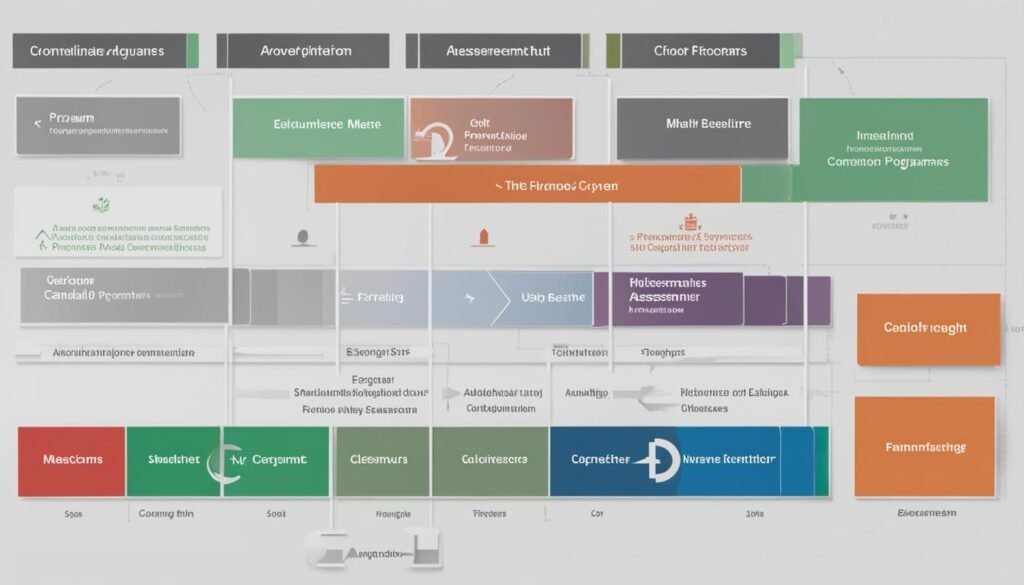
When deciding between course-based and thesis-based master’s programs in Canada , it’s important to understand the program requirements and assessments involved. Course-based programs typically require you to complete a specified number of courses, assignments, and examinations. This structure allows you to gain a broad understanding of the field through coursework and demonstrates your ability to apply knowledge effectively.
In contrast, thesis-based programs focus on independent research, where you’ll delve deeper into a specific area of interest and contribute to the field’s existing body of knowledge. In these programs, you’ll undertake original research, write a thesis, and often defend your work through an oral examination. This research-centric approach fosters critical thinking, problem-solving, and analytical skills.
The image below illustrates the different requirements and assessments in course-based and thesis-based master’s programs:
As you consider your strengths and preferences, think about how coursework, research, and examinations align with your learning style and career goals. If you enjoy a structured learning environment and prefer applying theory to practical situations, a course-based program may be the right fit. On the other hand, if you’re passionate about research and want to contribute new knowledge to your field, a thesis-based program could provide the academic rigor and opportunities you seek.
Regardless of the program type, it’s crucial to carefully review the program requirements, such as the number of courses or the thesis length, and ensure they align with your time availability and commitments. Additionally, consider the type of assessment that resonates with your learning style and allows you to demonstrate your knowledge effectively.
Networking and Collaborative Opportunities
Both course-based and thesis-based master’s programs in Canada offer a wealth of networking and collaborative opportunities that can significantly enhance your academic and professional journey. These opportunities allow you to connect with like-minded individuals, forge valuable professional connections, and contribute to the academic community in meaningful ways.
In course-based programs, you’ll have the chance to interact with your peers and esteemed faculty members through engaging group projects, lively discussions, and thought-provoking seminars. These collaborative experiences foster a supportive and dynamic learning environment, where you can exchange ideas, gain diverse perspectives, and build lasting professional relationships within your field.
Networking for Professional Connections
Networking in course-based programs opens doors to a wide range of professional connections. By actively engaging with your classmates and professors, you gain access to a network of professionals who share your passion and can offer valuable insights and opportunities. From informal conversations during breaks to formal networking events, you have numerous chances to connect with individuals who can become valuable mentors, collaborators, or future employers.
These professional connections can be particularly advantageous for those pursuing career-centric goals. Networking provides access to industry-specific information, job opportunities, and career advice that can accelerate your professional growth and help you stay updated with the latest trends and developments.
Collaborative Opportunities in Thesis-Based Programs
In thesis-based programs, you’ll have the unique opportunity to collaborate with renowned researchers within your field of study. Working alongside experts in their respective domains, you can contribute to cutting-edge research projects, expand your knowledge base, and make meaningful contributions to your academic discipline.
Thesis-based programs often provide opportunities to attend conferences, present your research findings, and publish your work in academic journals, further increasing your visibility within the academic community. These experiences allow you to connect with peers and experts from around the world, expanding your professional network and fostering collaborations that can have a lasting impact on your academic and research career.
By actively participating in networking and collaborative opportunities, you not only enhance your knowledge and skills but also pave the way for future collaborations and career advancements. Whether you choose a course-based or thesis-based program, make sure to consider the type of connections and collaborative experiences that align with your career goals, ultimately enriching your academic journey.
Funding and Scholarships
When pursuing a Master’s degree in Canada while working full-time, funding and scholarships are crucial in ensuring you have the financial support you need. While research funding opportunities are more commonly available in thesis-based programs, it’s important to note that course-based programs may also offer scholarships and assistantship positions.
Exploring the funding options available for both program types is essential in making an informed decision. Research the scholarships offered by universities, external organizations, and government agencies. These scholarships can provide the financial support you need to pursue your degree without placing excessive strain on your full-time job.
In addition to scholarships, assistantship positions are worth considering. These positions often come with a stipend or tuition remission and can help alleviate the financial burden of pursuing a Master’s degree. Talk to program coordinators or faculty advisors to learn more about assistantship opportunities and how they can provide you with the necessary financial support.
Remember, funding and scholarships can significantly impact your ability to pursue a Master’s degree in Canada while working full-time. Take the time to explore and consider all available options, ensuring that you make a well-informed decision that aligns with your financial situation and supports your academic and career goals.
Considering Future Prospects and Employability
When choosing between course-based and thesis-based master’s programs in Canada , you must carefully consider the future prospects and employability each option offers. Course-based programs focus on developing practical skills and knowledge directly applicable to the job market. The emphasis on practicality enhances your immediate employability and opens doors for career advancement opportunities.
On the other hand, thesis-based programs provide you with valuable research experience and the opportunity to contribute to the academic community. This research-oriented approach can be highly beneficial if you’re considering a career in research or planning to pursue further academic studies, such as a Ph.D.
When making your decision, think about your long-term career goals and the skills and experiences that will best support your desired path. Consider the immediate employability boost that course-based programs offer, as well as the long-term benefits of research opportunities and contributions to the academic field provided by thesis-based programs.
Seeking Guidance and Making an Informed Decision
Making an informed decision between course-based and thesis-based master’s programs in Canada requires guidance from faculty advisors and program coordinators. These experts possess valuable insights into the structure, requirements, and outcomes of each program.
To make an informed decision, engage in conversations with professors and professionals in your field of interest. Attend program information sessions to gather comprehensive information and ask questions to clarify any doubts or concerns.
The guidance provided by faculty advisors and program coordinators will help you obtain a thorough understanding of the available options and make a decision that aligns with your career aspirations, research interests, and work-life balance.
Remember, seeking guidance allows you to make an informed decision that sets you on the path towards a successful and fulfilling academic journey.
Pursuing a Master’s degree in Canada with a full-time job requires careful consideration of various factors. When choosing between course-based and thesis-based programs, it is essential to assess your career goals, research interests, time commitments, program requirements, and future prospects.
By evaluating these considerations and seeking guidance from faculty advisors and program coordinators, you can make an informed decision that aligns with your aspirations and work-life balance. Remember to prioritize your long-term goals and passion for the subject matter to ensure a fulfilling and successful academic journey.
Ultimately, whether you choose a course-based or thesis-based program, both options offer unique benefits and challenges. The key is to choose a program that suits your individual goals and circumstances. With the right decision-making process and careful consideration, you can pursue your Master’s degree in Canada while balancing your full-time job and unlocking new opportunities for professional growth and personal fulfillment.
Source Links
- https://www.macworld.com/article/670477/best-mac-or-macbook-for-students.html
Related Posts

Romanian Academic Expedition: Strategies for Higher Education Success
Embark on your Romanian Academic Expedition: Strategies for Higher Education Success to unlock opportunities and achieve academic excellence.

Portuguese Achievements: A Guide to Higher Learning
Unlock Portugal’s educational landscape with “Portuguese Achievements: A Guide to Higher Learning,” your roadmap to success.
- Request Information
- Find Faculty & Staff
- Info For Toggle Info Return to Menu Menu
- Search Open Search Close Search
- Message from the Chair
- Department Directory
- Undergraduate Studies
- Graduate Studies
- Co-op & Experiential Learning
- Research Areas
- Available Research Services and Equipment
- Faculty and Staff Directory
- Part-Time Faculty
- Annual Reports
- Honors & Distinctions
- Faculty Hiring
- Student Groups
- Diversity, Equity and Inclusion
- Industrial Advisory Board
- Resources for Current Students
- In the Media
- Spotlight Stories
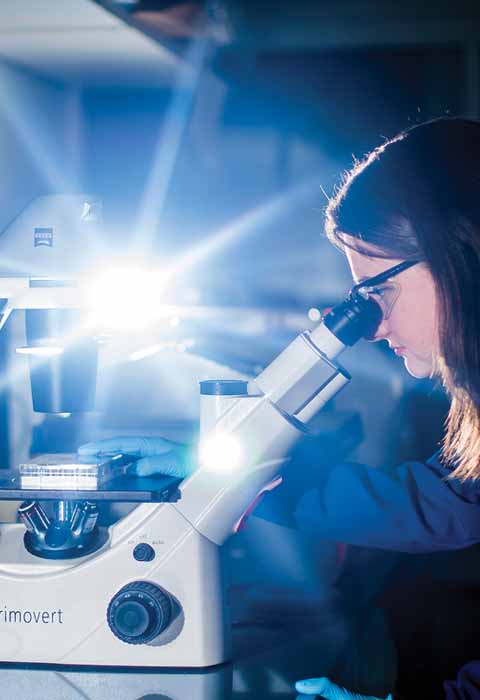
Master of Science in Chemical Engineering
The Master of Science (MS) in Chemical Engineering offers students the opportunity to develop expertise to tackle pressing challenges facing our society and our planet in areas such as biomedicine, energy, security, and sustainability. The program allows students to develop an in-depth understanding of the principles of chemical engineering through core coursework and applied electives, while gaining career experience through laboratory research or co-op.
Thesis (research-based) and course-based program options are offered. You may also participate in Northeastern’s cooperative education program, gaining up to eight months of professional work experience in your area of interest as part of the academic curriculum.
With a premier location in downtown Boston, a hub of high tech, biotech, academia, and medical and pharmaceutical institutions, including world-renowned hospitals, research in the department leverages the wealth of collaborations with neighboring universities, hospitals, medical centers and industry.
- Program Details
- Degree Requirements
- Admissions Information
- Tuition & Financial Aid
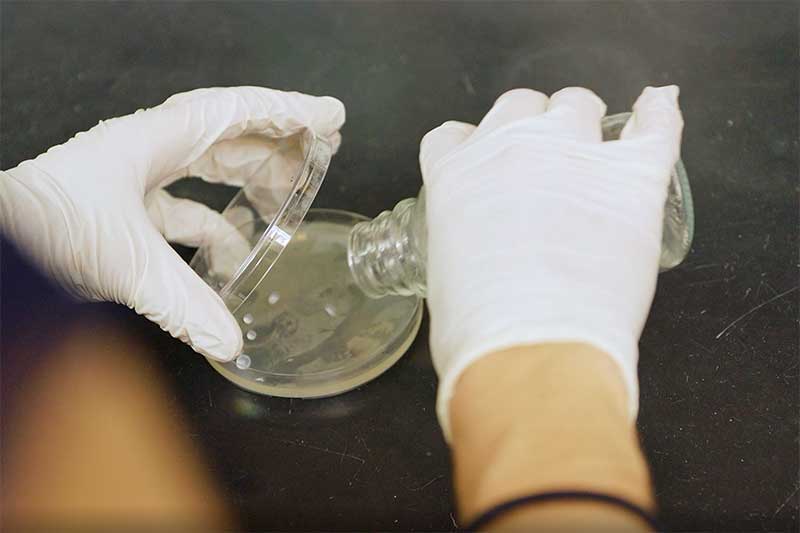
Innovative Curriculum - MS in Chemical Engineering
The Master of Science (MS) in Chemical Engineering is normally pursued by students with a Bachelor of Science in Chemical Engineering or closely allied fields. Students wishing to pursue the master’s degree but with undergraduate educational backgrounds other than chemical engineering may be required to complete supplementary undergraduate course work. These courses are in addition to the minimum course requirements.
The non-thesis MS degree is offered as either a full-time or part-time program to make it more accessible to students pursuing concurrent industrial careers. Students pursuing the non-thesis MS degree may, in exceptional cases, apply and seek admission to pursue a thesis MS degree following their first term of enrollment in the graduate program; if admitted, the thesis MS degree is offered only as a full-time program.
Both full-time Master of Science degree students and Doctoral Candidates are able to select thesis topics from a diverse range of faculty research interests. The department’s research focus areas include Biomolecular and Biomedical Systems; Complex and Computational Systems; Energy and Sustainability; Engineering Education and Pedagogy; and Materials and Nanotechnology.
With a premier location in downtown Boston, research in the department leverages the wealth of collaborations with neighboring universities, hospitals, medical centers and industry.
The department’s research areas include Biomolecular and Biomedical Systems; Complex and Computational Systems; Energy and Sustainability; Engineering Education and Pedagogy; and Materials and Nanotechnology. Graduate students are able to select thesis topics from a diverse range of faculty research interests.
New or prospective graduate students can learn about ongoing research topics from individual faculty members, faculty web sites and graduate student seminars. Graduate student seminars, where our students present the results of their research, are held on a regular basis and provide an interactive forum for learning and exchanging ideas.
MS students select from thesis-based (research) and course-based program options.
The non-thesis MS program is offered full time or part-time to make it more accessible to students pursuing concurrent industrial careers.
- ability to identify, formulate, and solve complex engineering problems.
- ability to explain and apply engineering design principles, as appropriate to the program’s educational objectives.
Over 15 graduate certificates are available to provide students the opportunity to develop a specialization in an area of their choice. Certificates can be taken in addition to or in combination with a master’s degree, or provide a pathway to a master’s degree in Northeastern’s College of Engineering. Master’s programs can also be combined with a Gordon Engineering Leadership certificate. Students should consult with their faculty advisor regarding these options.
Gordon Institute of Engineering Leadership Certificate
Students may complete a Master of Science in Chemical Engineering in addition to earning a Graduate Certificate in Engineering Leadership . Students must apply and be admitted to the Gordon Engineering Leadership Program in order to pursue this option. The program requires fulfillment of the 16-semester-hour curriculum required to earn the Graduate Certificate in Engineering Leadership, which includes an industry-based challenge project with multiple mentors and 16 semester hours of required chemical engineering course work.
Engineering Business Certificate
Students may complete a Master of Science in Chemical Engineering in addition to earning a Graduate Certificate in Engineering Business. Students must apply and be admitted to the Galante Engineering Business Program in order to pursue this option. The program requires the applicant to have earned or be in a program to earn a Bachelor of Science in Engineering from Northeastern University. The integrated 32-semester-hour degree and certificate will require 16 semester hours of the chemical engineering core courses and 16 semester hours from the outlined business-skill curriculum. The coursework, along with participation in co-curricular professional development elements, earn the Graduate Certificate in Engineering Business .
- Pik Leng Wong
- Angela Isibor
- Krishna Sirumalla
- Aida Lopez Ruiz
- Scholarship Report
Experiential Learning
Northeastern combines rigorous academics with experiential learning and research to prepare students for real-world engineering challenges. Northeastern is an R1 research institution, rated among universities with the highest research activity.
The Cooperative Education Program , also known as a “co-op,” is one of the largest and most innovative in the world, and Northeastern is one of only a few that offers a co-op program for graduate students. Through this program, students gain up to eight months of professional experience employed in their field of interest as part of the academic curriculum, giving them a competitive edge upon graduation. The College of Engineering has over 3,000 co-op employer partners globally. Our dedicated team of co-op coordinators prepare students for the co-op experience through resume building, developing interview skills, and guiding professional development. Some chemical engineering co-op employers include Ambri, Metalor Technologies, Nano-C, Pellion Technologies, Sanofi Genzyme, and Waters Corporation.
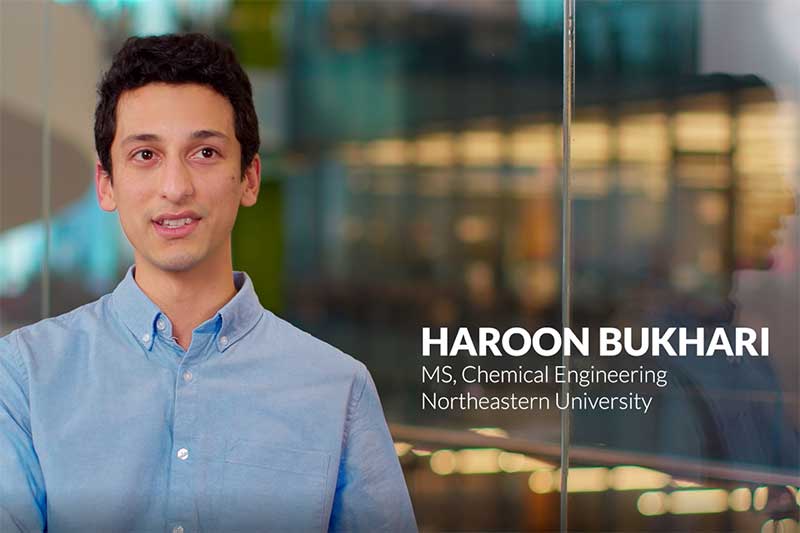
Academic Advising
The Academic Advisors in the Graduate Student Services office can help answer many of your questions and assist with various concerns regarding your program and student record. Use the link below to also determine which questions can be answered by your Faculty Program Advisors and OGS Advisors.
- Graduate Student Services
Admissions & Aid
Ready to take the next step? Review degree requirements to see courses needed to complete this degree. Then, explore ways to fund your education. Finally, review admissions information to see our deadlines and gather the materials you need to Apply.
- Connect with a Current Student
Student News
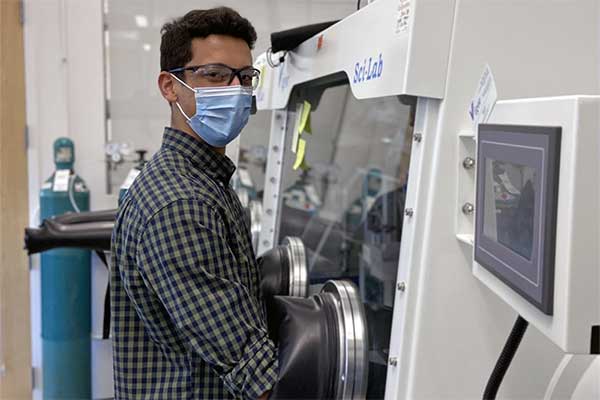
Chemical Engineering Master’s Student Works Toward Better Electric Vehicles with Battery Materials on Co-op
As electric vehicles become more prominent, accessible, and convenient, it is imperative that research continues to push the reliability of their batteries further. That’s what Haroon Bukhari, a chemical engineering master’s student explores each day as an employee on co-op at Rogers Corporation which is based onsite on Northeastern’s Innovation Campus in Burlington, Massachusetts.
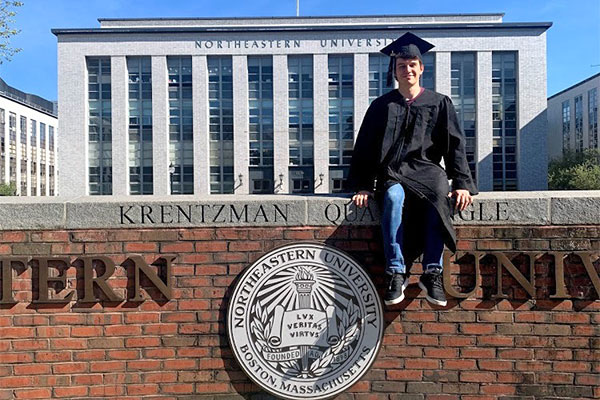
Reaching Goals Sooner with the PlusOne
Derek Smith, E’20, ME’21, initially decided he wanted to pursue a PlusOne degree after talking to his coworkers on one of his co-ops. “They admitted to me that they found the prospect of going back to school daunting,” Smith reveals. “It seemed more in line with my goals to keep going.” Now, the Long Island […]

Contributing to a Positive Vibe
“I don’t know why, but from a young age I’ve always loved chemistry,” says Lineyah Mitchell, E’21 and ME’21, chemical engineering. While she considered Ivy League universities, she wanted to go someplace where she could really focus on technical studies. Then she visited Northeastern. “I really liked the vibe when I visited,” Mitchell explains. “People […]
Hines and Eller Awarded Scranton Scholarships
Congratulations to chemical engineering student Julia Hines, E’21/ME’21 and bioengineering student Kerry Eller, E’21, who are recipients of Richard J. Scranton Scholarships.

Home » Missouri University Of Science And Technology » What Is The Difference Between Thesis Based And Course Based?
What Is The Difference Between Thesis Based And Course Based?
Table of Contents
The academic, thesis based Master’s differs from the professional degree in that it emphasizes original research and research methodology . Professional, course-based Master’s degrees are more structured and focus on the direct application of knowledge in teaching and educational administration contexts.
What is better thesis or coursework?
A thesis master’s degree is more research intensive . Students who aim to work on a thesis can expect to do more reading and writing as they specialize their knowledge. The coursework is generally centered around preparation for a final thesis, building their skills in research, data collection, analysis, and writing.
What is a course-based degree?
In a course-based program, all degree requirements are fulfilled by completing courses . It may also include a project, such as a major research paper or group project. Read this guide for helpful tips on working with a supervisor, preparing for a practicum and writing at the graduate level.
What is thesis based course in Canada?
Thesis-based master’s programs at UAlberta train students to conduct methodical, systematic, theory-based, and collaborative research with a diversity of outstanding people, in a multitude of leading facilities and stimulating environments .
What is the meaning of course-based Masters?
Course-based master’s degrees are based on structured course modules taught through lectures, seminars, laboratory work or distance learning , while research-based master’s degrees require the student to carry out their own research project(s) in a specialized field of study.
Can you get a PhD with a non-thesis Masters?
So the answer is yes, but it depends on the university . Show activity on this post. Applying for a PhD program depends on your curriculum vitae and the research work you have done during the years before your PhD.
Do all Masters require a thesis?
Yes. Master’s programs focused more on application than research typically don’t require a thesis – although they may still give students the option. Examples of common non-thesis master’s programs include nursing, business, and education.
What is thesis based?
What is research-based course.
Course-based Masters Degrees are based on course modules taught through lectures, lab work, seminars or distance learning, while research-based Masters Degrees requires student to carry out their own research project in a specialized field of study .
What is the difference between coursework and research masters?
Course-based Masters Degrees are taught through lectures, lab work, workshops, or distance learning, while research-based Masters Degrees enable students to conduct their research projects in a specialized area. Research-based postgraduate programs usually take longer to complete than course-based programs.
Is thesis based Masters funded in Canada?
Most thesis-based graduate programs provide funding for students in the first two years of a Master’s degree and the first four of a PhD . More information is available from the program.
Is a non thesis masters worth it?
Students whose main reason to pursue a Master’s degree is advancement within a current job or movement from one professional position to a new workforce position would do well to consider a non‐thesis option, as it may well provide a more flexible schedule and shorter path to completion. If you want to pursue a Ph.
Can I do PhD after course based Masters in Canada?
The requirements to study in Canada at doctorate level vary between universities and courses, but you generally need the following: A master’s degree in a related field, with strong grades and proven research ability and potential .
What are the 4 types of degrees?
College degrees generally fall into four categories: associate, bachelor’s, master’s, and doctoral . Each college degree level varies in length, requirements, and outcomes. Each college degree aligns with students’ different personal interests and professional goals.
What is Master without thesis?
Also known as Taught, Professional, or Course-work Masters , this type of master’s degree involves classroom-based studies for a pre-defined set of core subjects every semester. Each core subject (and elective) ends in an exam.
Is a dissertation a thesis?
Dissertation vs. As mentioned earlier, a thesis is presented at the culmination of a master’s program, whereas, as dissertation is presented to earn a PhD . A thesis is a compilation of research ensuring that the researcher is well informed and has knowledge about the research topic learnt in the study program.
How many years is a PhD after a Masters?
Time commitment-Many American PhD programs do not offer significant coursework reduction for students who already have Master’s degrees. This means that they will have to do a five to seven year PhD on top of their one to three year Master’s.
What’s the difference between a PhD and a doctorate?
Bottom line: As the PhD is more academic, research-focused, and heavy on theory, an applied doctorate degree is intended for you to master a subject in both theory and practice .
How many years is a PhD?
four to six years On average, a Ph. D. may take up to eight years to complete. A doctorate degree typically takes four to six years to complete—however, this timing depends on the program design, the subject area you’re studying, and the institution offering the program.
Is writing a thesis hard?
Writing a thesis or a dissertation can be a challenging process for many graduate students . There are so many chapters to complete, and writing each individual chapter requires an immense amount of hard work and a strong motivation.
What degree requires a thesis?
The primary difference between a dissertation vs thesis is the degree programs that require these projects. Students in a master’s degree program will write a thesis, whereas students in a doctoral degree program will complete a dissertation.

By Antonia Leonard
Antonia Leonard is an education expert who has dedicated her life to helping students achieve their academic goals. She has worked in schools all over the world, and has developed groundbreaking curricula that have helped countless students excel.
Antonia is a firm believer in the power of education, and she is passionate about helping students reach their full potential. She is also a strong advocate for equal opportunity, and she works tirelessly to ensure that all students have access to quality education regardless of their socioeconomic status or race.
Antonia is a gifted educator, and she is widely respected within the education community. She has received numerous awards and accolades for her work, including being named one of the "Top 10 Educators to Watch" by Education Week magazine.
You might also like:
How is i20 amount calculated, is a mst a masters, what is the difference between an ma and an mst.

Publication-based doctorate: is it for me?
Potential research higher degree candidates from academia or industry will need to decide between a doctorate by thesis or by publication. Here are key questions to ask before embarking on the doctoral journey

You may also like

Popular resources
.css-1txxx8u{overflow:hidden;max-height:81px;text-indent:0px;} Emotions and learning: what role do emotions play in how and why students learn?
A diy guide to starting your own journal, universities, ai and the common good, artificial intelligence and academic integrity: striking a balance, create an onboarding programme for neurodivergent students.
Prospective doctoral candidates have much less understanding of the process and requirements for a publication-based doctorate than they do for the more popular thesis-based route. Completing a doctorate, thesis- or publication-based, takes time and effort. Selecting the right mode is important before starting a research higher degree (RHD), so that the prospective doctoral candidate can be confident of completing it.
Here, I discuss the questions that future doctoral candidates should ask if they are considering a publication-based doctorate.
- Why get a PhD by publication (and other career tips)
- Why getting a PhD is like building a Lego duck
- Don’t jettison traditional academic writing just yet
What is my goal in completing a doctorate?
A thesis-based doctorate helps the candidate to explore a subtopic of a research field as deeply as possible, based on few theoretical variables and within a limited practical context (for example, a limited dataset from a single socio-economic setting). A publication-based doctorate could explore a topic with more variables and contexts (for example, different publications on same topic would have different variables and datasets). It gives a publication-based doctorate a little more flexibility to explore a topic more widely. Therefore, the goal of exploring a subtopic area as widely as possible could fit better for a publication-based doctorate.
What is my thesis?
Yes, even for a publication-based doctorate, candidates need to produce a thesis, a theory or a proposition on a single topic, in combination with the overall contributions of published papers. As a result, the candidates need to think about how they can draw together the relevant findings from published papers to produce new knowledge on a single topic.
Are my publications cohesive?
For a publication-based doctorate, the publications you may already have and the outputs you plan to produce within an agreed time frame should focus on and contribute to a single subtopic. So ask yourself: how unified are my existing and planned publications? Designing the research aim, research question, methodology and contribution of your intended publications in relation to these sections among your existing publications is instrumental to ensuring that your publications are cohesive.
Where am I publishing?
Understanding where you publish should be a key consideration, as not all publications will be eligible for inclusion in your submission. All fields of studies have their own benchmark publications. For example, in business, the journal lists of the Association of Business Schools in the UK and the Australian Business Deans’ Council are often used to indicate a publication’s quality. In general, a publication-based doctorate could consist of journal papers, book chapters or published conference proceedings. Industry-based publications could be considered as well in some instances (for example, if you have an article published by a reputable chamber of commerce). Articles in predatory journals and publications such as brief op-ed articles or blogs might not be considered for a doctorate by publication.
Will the findings and contributions of my publications stand the test of time?
Doctoral candidates may already have publications, perhaps even in good academic journals, but they may be 10 years old. The knowledge produced perhaps made a contribution to your field of study, but the subsequent progress of the field may have surpassed your work or made it obsolete over time. So considering the potential significance of publications during the projected time of a doctoral submission is important. Comparing your work with existing publications in your field is a good way to understand the significance of the work you produce.
What is the extent of my theoretical and practical contribution?
All doctorates should make significant contribution of theoretical knowledge and practical implication. But we know that the extent of theoretical and practical contribution of a RHD can differ based on the type of doctorate someone would undertake. For example, a doctor of philosophy needs to produce significant theoretical knowledge, whereas a professional doctorate would need more practical implications. Therefore, the candidate needs to consider the extent of theoretical and practical implications of their publications, in order to decide whether a doctor of philosophy or a professional doctorate would be more relevant.
Am I publishing as a sole author or a co-author?
Often, we work in a team and publish with our co-authors. Therefore, if you are planning to include one or several co-authored publications in a publication-based doctorate, securing permission from co-authors to include the relevant sections (that you have contributed to those co-authored publications) into a publication-based doctoral thesis will be helpful in avoiding any future conflict of interest among co-authors.
What is my career stage?
Career stage would have an influence on whether to opt for a doctorate by publication. For example, a candidate may already have five or 10 years of academic teaching or industry experience but has perhaps produced few academic or industry-based publications. In general, working to publish more papers in next two years, and combining them with existing publications to produce a new knowledge, would be useful to submit a thesis by publication. Mid-career candidates from either academia or industry might be considering a publication-based doctorate alongside other commitments but find that their work-life balance is unsustainable. In this case, a doctor of philosophy would be more appropriate for academic candidates, while a professional doctorate would be more relevant for candidates from industry.
How do I find a PhD supervisor?
Irrespective of whether the doctorate is by thesis or publication, RHD supervisors play a significant role in training their candidates to become independent researchers. So looking at the prospective supervisors’ profile, comparing your topic with their research area, emailing them to share your draft proposal, and requesting an appointment to talk about it further will be valuable for prospective candidates. It will help them to develop their topic of research, understand research procedures and requirements, and secure a supervisor.
These questions will help an academic or an industry professional considering a doctorate by publication to weigh their options carefully.
Riad Shams is assistant professor and head of the PhD programme at the Newcastle Business School at Northumbria University, UK. He is a board member of the Northern Advanced Research Training Initiative, a fellow of the Higher Education Academy and the EuroMed Academy of Business, and associate editor of the Journal of Social Entrepreneurship .
If you would like advice and insight from academics and university staff delivered direct to your inbox each week, sign up for the Campus newsletter .
Emotions and learning: what role do emotions play in how and why students learn?
Global perspectives: navigating challenges in higher education across borders, how to help young women see themselves as coders, contextual learning: linking learning to the real world, authentic assessment in higher education and the role of digital creative technologies, how hard can it be testing ai detection tools.
Register for free
and unlock a host of features on the THE site
Watch CBS News
What caused the Dali to slam into Baltimore's Francis Scott Key Bridge? What we know about what led up to the collapse
By Kerry Breen
Updated on: March 27, 2024 / 7:43 PM EDT / CBS News
Shocking video showed the moment a massive cargo ship collided with Baltimore's Francis Scott Key Bridge early Tuesday morning, sending parts of the decades-old suspension bridge, along with people and vehicles, into the Patapsco River.
Six people who were on the bridge are missing and presumed dead , officials said late Tuesday. Two others were rescued from the water. All eight were construction workers who were repairing potholes on the bridge, officials said. There were 22 Indian nationals, including two pilots, aboard the cargo ship.
Investigators and officials are now crafting a timeline of events, including what caused the Singapore-owned vessel , called the Dali, to hit the bridge just minutes after leaving port . Here's what we know so far.
What caused the Dali to slam into the Francis Scott Key Bridge?
The Dali, which was chartered by shipping giant Maersk and operated by Synergy Marine Group, hit the Francis Scott Key Bridge shortly after leaving the Port of Baltimore.
An unclassified memo issued by CISA, the Cybersecurity and Infrastructure Security Agency, said the ship reported losing propulsion . Maryland Gov. Wes Moore said the ship's crew reported a "power issue." A spokesperson for the National Transportation Safety Board, which is investigating the crash, said the agency still needs to verify that the Dali lost power before striking the bridge column.

Two U.S. officials told CBS News multiple alarms rang out on the ship, alerting pilots and crew to an issue on board. The crew ran several system tests to attempt to remedy the loss of propulsion from the motor, but the tests proved unsuccessful. At that point, the ship's pilots alerted the Maryland Department of Transportation and the Maryland Transit Authority.
That alert allowed local officials to stop traffic on the bridge and likely saved lives , officials said.
The ship's crew tried to deploy the anchor, though it remains unclear how much progress was made, multiple officials said. The massive ship is over 900 feet long and was moving at about 8 knots, or just over 9 miles per hour. Authorities said that speed is considered "very rapid."
Captain Michael Burns, executive director of the Massachusetts Maritime Academy's Maritime Center for Responsible Energy, told CBS Boston that stopping a cargo ship is difficult, especially in such a short time.
"It's extremely challenging, and takes years of experience and training in order to be able to do this safely," he said. "It can take up to a mile for some of these ships to get stopped, depending on the circumstances, so we really need to think well out, miles ahead of the ship."
Why did the Dali lose propulsion?
It's not clear what caused the vessel to lose propulsion, officials said.
A spokesperson for the NTSB told CBS Baltimore that it had collected the ship's data recorder, and would review and analyze the material there to determine what happened aboard the vessel in the moments before the collision.
That data recorder will also be used to establish a timeline of events.
What happens when a ship loses propulsion?
James Mercante, the president of the New York Board of Pilot Commissioners, told CBS News that a ship that has lost steering and power is essentially "a dead ship just being carried by the current or its own momentum."
He highlighted a moment in the video of the crash that appears to show a "big, big puff of black, real dark black smoke" which might indicate that the vessel's power was "restored at the last minute" and that the pilot was "attempting to make an emergency maneuver" to avoid hitting the bridge. However, he emphasized that it would be difficult to stop the massive cargo ship, especially in such a short time.
"It would take quite a while — probably the length of five [or] six football fields — to bring that ship to a stop, even after dropping the anchors, because of its power and momentum," said Mercante. "This is a behemoth."
- Francis Scott Key Bridge
- Bridge Collapse

Kerry Breen is a reporter and news editor at CBSNews.com. A graduate of New York University's Arthur L. Carter School of Journalism, she previously worked at NBC News' TODAY Digital. She covers current events, breaking news and issues including substance use.
More from CBS News

Pete Buttigieg says "we don't fully know" conditions for Baltimore bridge repair

First vessel passes through temporary channel near Key Bridge wreckage site

Transcript: Baltimore Mayor Brandon Scott on "Face the Nation," March 31, 2024
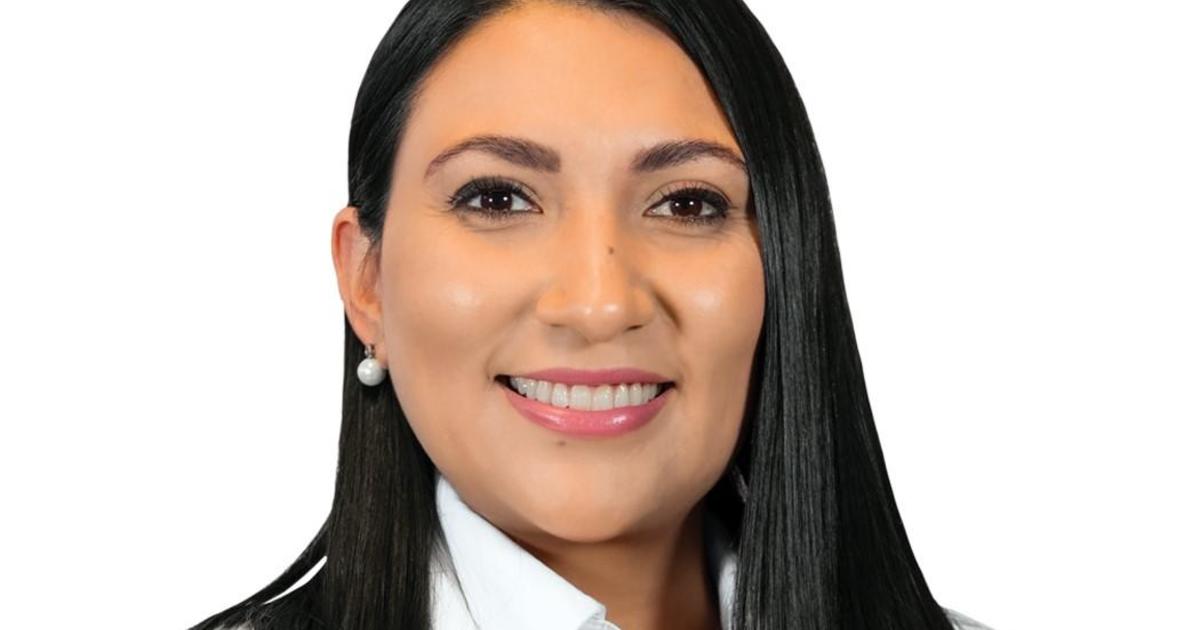
Mayoral hopeful killed just as she began campaigning in Mexico
Advertisement
The Dali was just starting a 27-day voyage.
The ship had spent two days in Baltimore’s port before setting off.
- Share full article

By Claire Moses and Jenny Gross
- Published March 26, 2024 Updated March 27, 2024
The Dali was less than 30 minutes into its planned 27-day journey when the ship ran into the Francis Scott Key Bridge on Tuesday.
The ship, which was sailing under the Singaporean flag, was on its way to Sri Lanka and was supposed to arrive there on April 22, according to VesselFinder, a ship tracking website.
The Dali, which is nearly 1,000 feet long, left the Baltimore port around 1 a.m. Eastern on Tuesday. The ship had two pilots onboard, according to a statement by its owners, Grace Ocean Investment. There were 22 crew members on board, the Maritime & Port Authority of Singapore said in a statement. There were no reports of any injuries, Grace Ocean said.
Before heading off on its voyage, the Dali had returned to the United States from Panama on March 19, harboring in New York. It then arrived on Saturday in Baltimore, where it spent two days in the port.
Maersk, the shipping giant, said in a statement on Tuesday that it had chartered the vessel, which was carrying Maersk cargo. No Maersk crew and personnel were onboard, the statement said, adding that the company was monitoring the investigations being carried out by the authorities and by Synergy Group, the company that was operating the vessel.
“We are horrified by what has happened in Baltimore, and our thoughts are with all of those affected,” the Maersk statement said.
The Dali was built in 2015 by the South Korea-based Hyundai Heavy Industries. The following year, the ship was involved in a minor incident when it hit a stone wall at the port of Antwerp . The Dali sustained damage at the time, but no one was injured.
Claire Moses is a reporter for the Express desk in London. More about Claire Moses
Jenny Gross is a reporter for The Times in London covering breaking news and other topics. More about Jenny Gross

COMMENTS
Complete your master's degree in months vs. years. Another big difference between course-based and thesis-based is the length of the program. Course-based master's programs typically take around 1 year to complete (3-4 semesters of full-time study), while thesis-based programs are a longer commitment and are often completed in 2 years (5-6 semesters of full-time study).
The next milestone in your academic path often involves pursuing a Master's degree, with options ranging from thesis-based programs to non-thesis alternatives. Deciding between these two paths is significant as it shapes your academic and career paths. ... Coursework. Non-thesis programs prioritize coursework, fostering the development of ...
The majority of your time in a course-based program is spent attending lectures, seminars, and workshops. Assessment is primarily through exams, coursework, and projects. Research-based or thesis-based programs are centred on independent research and academic exploration. The core of the program is the research thesis.
4 mins. It can be a little tricky figuring out which postgraduate degree is for you. That's why we've done the work for you to clarify the differences between a coursework degree and a research degree, and where each could take your career. Tl;dr: The main difference between these two styles is coursework has classes and research has a thesis.
For a Thesis based Master's you will need a supervisor which may make the admission process a bit more complex. On the other hand, some course-based Master's will require evidence of professional experience (e.g. MBA). Duration. Thesis based Master's are mostly 2 years, while course based Master's usually vary between 1 to 2 years. Funding.
In deciding between the two sets of requirements, it helps to understand exactly what each entails. The academic, thesis-based master's differs from the professional degree in that it emphasizes original research and research methodology. Professional, course-based master's degrees are more structured and focus on the direct application of ...
A thesis master's degree is more research intensive. Students who aim to work on a thesis can expect to do more reading and writing as they specialize their knowledge. The coursework is generally centered around preparation for a final thesis, building their skills in research, data collection, analysis, and writing.
The Faculty of Graduate Studies sets out the minimum qualifications for admission. However, graduate program requirements may call for higher scores, additional documentation and testing. Meeting the minimum requirements does not guarantee entry into a graduate program as admission is competitive. Find your program of interest to view its ...
Ultimately, no matter the path you choose for your graduate school journey, you are not restricted to only course-based learning or writing a thesis. You truly can do whatever you want to do if you are willing to put in the work. What is important is choosing a school that will encourage you to reach for the stars and support you if you want to ...
Choosing between a thesis-based or coursework-focused LLM program structure is pivotal for Blackstone School of Law and Business students. The two options present distinctive advantages and considerations, shaping the academic journey and future career prospects. Understanding the nuances between these structures helps students make informed ...
The thesis-based path provides a number of pros and cons. First off, it is considered the more 'traditional' path. Oftentimes, this is the path to a master's degree offered more commonly than the course-based. Completing a thesis-based program also can set you, an international student, up better to participate in a doctorate program upon ...
When deciding between course-based and thesis-based programs, program duration is an important factor to consider. Course-based programs typically have a shorter duration compared to thesis-based programs since they primarily focus on coursework. This shorter duration can be beneficial for individuals juggling work and studies.
Summary of Requirements. As a thesis-based master's student at UAlberta, you need to complete a number of program requirements: define your research problem, carry out your thesis research, and write and defend your thesis-within a four year designated timeframe. Degree requirements and responsibilities are both academic and administrative.
Thesis based research might not start until that is done, though that isn't true everywhere. With a course based masters you likely have much, if not all, of the knowledge for qualifiers. An additional masters would probably just slow you down overall, as you would still need to find an advisor and a topic that is mutually acceptable. ...
A thesis based master's will more than likely take longer than a coursework-based master's (and may be a separate degree- a MS vs a PSM). My advice, given that you have time is to reach out to the programs you are interested in and ask what graduates go on to do with the exact degree (s) they offer. My experience is that coursework based ...
The program allows students to develop an in-depth understanding of the principles of chemical engineering through core coursework and applied electives, while gaining career experience through laboratory research or co-op. Thesis (research-based) and course-based program options are offered.
Course based masters are not as valuable as thesis based. Course based masters are essentially a 2 year extension of your undergrad. Memorize known information and write it down on paper. When you have a thesis, your brain is working in an entirely different way. If you have a good thesis topic and supervisor (which is very important) you aren ...
If you need the funding from a TA/RA to cover your tuition or extra expenses, go for a thesis-based masters. Your chances of getting these positions will increase when compared to a course-based masters. If you have money and your end goal is to secure a job, go for course-based masters. Your employer doesn't care, unless you're going into a R ...
Thesis-based Master's Degree. Requirements for a Master's Degree with Thesis Major and Related Field(s) or Minor. Students must complete an approved program of coursework consisting of at least 20 graduate-level course credits in the major field, and at least 10 thesis credits (8777). Students who wish to complete a designated minor that will ...
The academic, thesis based Master's differs from the professional degree in that it emphasizes original research and research methodology. Professional, course-based Master's degrees are more structured and focus on the direct application of knowledge in teaching and educational administration contexts. What is better thesis or coursework? A thesis master's degree […]
A thesis-based doctorate helps the candidate to explore a subtopic of a research field as deeply as possible, based on few theoretical variables and within a limited practical context (for example, a limited dataset from a single socio-economic setting). A publication-based doctorate could explore a topic with more variables and contexts (for ...
The coursework based or thesis based? I plan to work on my own startup in near future and not stay in academia. Some people say that coursework is preferrable and some say thesis is preferrable in IT industry. A friend suggested that considering my situation, coursework is better because I need to get out of Pakistan ASAP cuz currency is taking ...
Investigation into how ship lost power before bridge collapse 04:11. Shocking video showed the moment a massive cargo ship collided with Baltimore's Francis Scott Key Bridge early Tuesday morning ...
The Dali was built in 2015 by the South Korea-based Hyundai Heavy Industries. The following year, the ship was involved in a minor incident when it hit a stone wall at the port of Antwerp. The ...